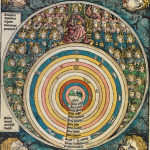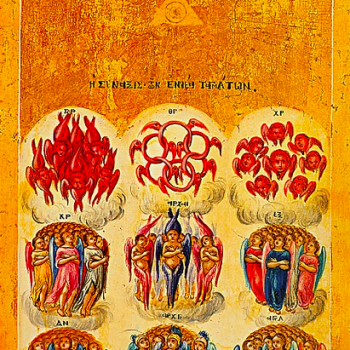The Second Love
This passage is kind of an odd one. As C. S. Lewis pointed out* in The Four Loves, friendship is not a metaphor Scripture uses all that much for God’s love of his people. It is certainly rarely used when compared to the parent-child relation (principally father-child: e.g. in Deuteronomy, Isaiah, Hosea, Romans, or Hebrews, but also mother-child: e.g. in Isaiah again, Luke, or Galatians) or the bridal analogy (e.g. in Psalms, Wisdom, Jeremiah, Ezekiel, Hosea again, I Corinthians, or Revelation). Here, however, the Fourth Gospel’s frequent use of son-father and apprentice-master imagery gives place, rather exceptionally, to a simple and human reaching-out from friend to friend.
The same thing happens in one other passage in John: Peter’s reinstatement after his apostasy.

The Appearance on Lake Tiberias, Duccio
di Buoninsegna, early 14th. cent.
Why it does this, and does it in these two places, is of course hard to be sure about. I have got a guess about the latter, which appears below, after the textual notes.
John 15.9-17, RSV-CE
As the Father has loved me,a so have I loved you; abideb in my love. If you keep my commandments, you will abide in my love, just as I have kept my Father’s commandments and abidec in his love. These things I have spoken to you, that my joyd may be in you, and that your joy may be full.

Selection from the beginning of Matthew in
the Lindisfarne Gospels, c. 700.
This is my commandment, that you love one another as I have loveda you. Greater love has no man than this, that a man lay down his lifee for his friends. You are my friendsf if you do what I command you. No longer do I call you servants, for the servant does not know what his master is doing; but I have called you friends, for all that I have heard from my Father I have made known to you. You did not chooseg me, but I chose you and appointed youh that you should go and bear fruit and that your fruit should abide; so that whatever you ask the Father in my name, he may give it to you. This I command you, to love one another.
John 15.9-17, my translation
Just as the Father lovesa me, I also love you: stayb in my love. If you observe my commissions, you are staying in my love, just as I have observed the commissions of my Father and am stayingc in his love. I have told you these things so that my joyd may be in you, and your joy may be made full.
This is my commission, that you love each other, just as I lovea you; no one has a greater love than this, that one should set his life asidee for his friends. You are my friends,f if you do what I commissioned you to. I no longer call you slaves, because a slave does not know what his lord is doing; I have termed you friends, because everything I heard from my Father, I made known to you. You did not selectg me, but I selected you, and have set you asideh so that you may lead and bear fruit and your fruit may stay, so that whatever you will ask the Father in my name, he might give to you. I give you this commission: that you love each other.
Textual Notes
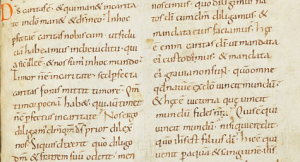
a. has loved/love … have loved/love: These verbs presented a curious problem, one not usually posed by this kind of verb. They’re in what’s known as the present perfect,** indicating a verb that is technically past, but whose meaning is currently relevant (the classic English exemplar is “I have eaten”). The thing is, in English, the present perfect carries a mild connotation that the agent has ceased doing the action; at first I was going to use a simple preterite, “loved,” but of course the connotation of no longer doing so is even stronger in “I loved you” than it is in “I have loved you” (and in fact the latter can imply continuation, e.g. if it’s an abrupt confession worded “I have loved you for a very long time”). I therefore eventually settled on a simple present: it’s not absolutely unheard of as a translation for a present perfect, but not the norm or anything like it. I feel very rebellious.
b. abide/stay: This of course continues the translation call I made in the post for last Sunday. I meant to mention in that post, but forgot, that part of the idea I’d like to bring out in the use of “stay” here is its role in the phrase have X to stay—it’s a word of housing and living, not merely of continued physical presence (which is why, though archaic, abide is also a good rendering!).
c. you will abide … I … abide/you are staying … I … am staying: Contextually, the RSV’s choice to substitute a future tense for what’s technically a present makes sense: it’s natural to interpret the text as talking about a future state of affairs that will obtain.† However, my hunch is that the text is actually doing something superficially similar but essentially distinct: providing a theological definition. I think the idea of “staying in his love” is being, not held out as a positive result of future faithfulness, but explained to be fundamentally the same thing as “observing his commissions.” I’ve accordingly chosen to render these two present tense verbs—the first verbs of our passage to appear in the simple present indicative—as present progressives.
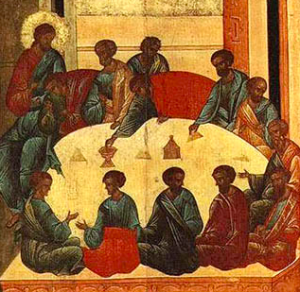
Anonymous Russian ikon of the Last Supper,
written in 1397.
d. joy: I wanted to make a note of this word not because it’s unusual in itself or uncommon in the New Testament, but simply because it has ties to many more words than you might think, ties we normally miss in English because our translations don’t use related translations (even when they can, which they often can’t). The word itself is χαρά [chara]. This is related to the verb χαίρω [chairō], “to rejoice, be of good cheer,” which also (in the imperative) was a common Greek salutation for both greetings and farewells, χαῖρε [chaire], or χαίρετε [chairete] in the plural. (The now-obsolete English greeting hail, surviving only in fossil phrases like Hail Mary, was of the same sort: it was related to the words hale and whole, and meant “Be well” or “Have good health.”)
Another relative is χάρις [charis], traditionally translated “grace” in English: this is a good translation if we remember the full range of the English word (which it probably got from the Greek), including not only “favor, good will,” but also “thanks, gratitude,” “influence, ‘pull,'” and also “delight, beauty, charm, elegance”—the mythological figures known as the Graces, minor goddesses who governed loveliness, innocent pleasure, festivity, and laughter, were named the Χάριτες [Charites].‡ This is also the origin of χάρισμα [charisma], which is where we get the modern social term “charisma” and the theological term “charism”; its most familiar translation is probably “spiritual gift,” though that isn’t very good. “Endowment of favor” is more the idea—like a noble being awarded by a monarch for faithful service with a title that is, itself, another responsibility. (In The Lord of the Rings, it’s actually pretty accurate to think of “King of Gondor” as a χάρισμα that Aragorn takes on.)
And finally, going back to the sense “gratitude.” The consecration of Communion was conceived of very early in the Church’s history—possibly as early as the New Testament; see the end of Hebrews—as a thank-offering, in continuity with those outlined in Leviticus. The name applied to it was accordingly “thanksgiving,” or in Greek, εὐχαριστία [eucharistia].

e. lay down his life/set his life aside: Obviously the distinction between these idioms is small. However, “set aside” is marginally more literal, and I’ve preferred it as being slightly more open-ended: to lay down one’s life requires death, but to set one’s life aside is, in literal terms, even less focused on the “what will happen to me” part of things. (Of course, Jesus’s setting-aside of his life did result in losing it, and he was resurrected, so there’s a certain amount of “eating one’s cake and having it” here anyway.)
f. friends: As mentioned above, this isn’t that common a word in the New Testament, or for that matter in the Old; Scripture throws itself with abandon into metaphors that call us God’s wife, God’s sheep, God’s little children, but “friend” is a rarity. Two reasons, neither of them original, spring to mind: first, friendships are typically between equals or near-equals, socially speaking, and obviously God can (apart from the Incarnation) have no equals of … any kind! This makes the analogy difficult to apply.
Second, friendships are typically chosen, not just in the “absolute” sense that all of our acts are chosen, but even in the sense that we choose what to have for lunch. By way of contrast, animals don’t even seem to have the same capacity for choice that human beings do; we have no power of choice at all over what family we are born into; and, while the decision to marry is within their power, any pair of lovers would laugh at the question “Why did you choose to fall in love?” Jesus makes the point in this very passage that the principal choice here was not their own. And from a philosophical point of view, it tracks: between an—or rather the—infinite, necessary Being and contingent creatures like ourselves, there is a disparity of freedom that cannot even be measured, in any way.
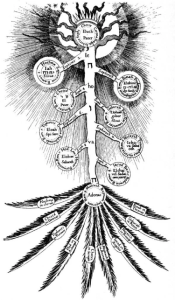
Not even with … whatever this is.
Of course, that somewhat prompts the question of why friendship is ever used as an analogy for the love between God and man. I have a few guesses, which I’ll go into further below.
g. choose/select: The verb here, ἐκλέγω [eklegō], is one of those multivalent preposition-verb compound words, which are so common in Greek and Latin as well as English; λέγω—related as it is to λόγος [logos], which you may recognize from about 800% of sermons about John 1.1-3—means not only “to say, speak, tell,” but also “to gather,” “to arrange, put in order,” “to name, call,” and “to reckon, count, calculate.” Obviously a word like that is ready to develop in a lot of possible semantic directions! The direction it in fact developed in was administrative; besides the more common “to select, choose,” ἐκλέγω could also mean “to levy taxes, exact tribute.” I therefore thought that a translation which sounded just slightly more “lawyer-ese” would suit the tone nicely.
h. appointed you/set you aside: The verb here is just the same as the one I translated as “set aside” a few sentences ago, though here the context is not (inherently!) lethal. “Appointed” is a perfectly good translation, but the more literal “set aside” also rather echoes the idea of being “set apart,” one of the key motifs in all Scriptural descriptions of holy things, and of the people designated to deal with holy things.
Lovest Thou Me?

You’ve probably heard of the “four loves.” These are traditionally listed as στοργή (storgē), φιλία (philia), ἔρως (erōs), and ἀγάπη (agapē); they equate, roughly, with family affection, friendship, romantic love, and philanthropic or unconditional love. One of the striking things about Jesus’ reinstatement of Peter in John 21 is that, the first two times he asks “Do you love me?”, he uses a verb related to the noun ἀγάπη; the third time, however, he uses a different verb, φιλέω (phileō), the one related to φιλία.
Now, the contrast here should not be pushed too far. There were distinctions in how these words were used, yes, but the distinctions weren’t rigorously observed (any more than our distinction between love and like). In particular, φιλέω tended to be the generic word for “to love” and to intrude on the meanings of the other three. But it is my opinion, personally, that the distinction in this case is significant. The passage from John 15 above was, to all appearances, the first time Jesus had spoken to the Twelve like this, the first time he had “called them friends.” Clearly this would be something of a milestone in Peter’s friendship (as he could now call it) with Jesus. Presumably, that would have been an additional sting of horror, a very few chapters later on, when he “began to curse and swear” and was then suddenly brought home to himself via cockcrow.
I think that, if Jesus was going to reinstate Peter as both Rock and friend, then emotionally speaking, Peter had to go here again. Otherwise, I suspect that title, “friend,” would always represent (in Peter’s own mind) something he had had for a few brief hours and then lost—a loss even the Resurrection couldn’t wipe out; but Jesus wouldn’t have that. He reached right into the awkward, painful, hideous place and made sure that that bone was set right: not for his benefit, of course, but for Peter’s.

The Ascension Edicule on the Mount of Olives
in Jerusalem. Photo by Wikimedia contributor
Adriatikus, used under a CC BY-SA 3.0 license
(source).
As for the fact that the Upper Room Discourse, as well as the meeting by the Sea of Galilee, are the two instances of Jesus using this rarest analogy for the love between man and God, my guess is that this has to do with the theming and structure of John. John refers several times to the Crucifixion obscurely by phrases like “the Son of Man must be lifted up,” a phrase which could equally (if taken more literally) refer to the Resurrection and the Ascension; this, combined with some other devices in John (e.g., he and Luke are the only evangelists who allude directly to the Ascension), leads some commentators to believe that, for John, the Crucifixion, Resurrection, and Ascension are theologically a single act, which we might call the Exaltation. (This is also why the liturgy of the Triduum, though spread over three days, is considered a single liturgy, and why the sign of the cross is not made at the end of the Maundy Thursday service or the beginning or end of the Good Friday service.)
What has this got to do with friendship? Well, the distinctive character of friendship among the other loves is that it is the most equal, the most freely chosen. The unique character of the Incarnation is that this Man is the only one who is also God; but the union of the two natures is not arbitrary. It is a beginning. The fathers loved saying that we are by grace what Christ is by nature; to this day, the East speaks of salvation most of all as theosis, divinization. That the Exaltation should be thus bookended by two instances of Jesus looking at a mere man, and a frail man, and saying “You are my friend” … it seems pretty perfect.
*”Am I still in this mood.” Hon. I am always in this mood.
**The reason “perfect” gets attached to the names of so many grammatical tenses is that the verbal meaning—perfect, rather than perfect—used to govern this word’s “center of gravity”; its primary synonyms were words like “complete” and “finished,” rather than “flawless” or “ideal.” It is in this older sense too that it appears in the Athanasian Creed, describing Jesus as “perfect God and perfect man, of a reasonable soul and human flesh subsisting”. Doubtless many people now take this to be a statement about his sinlessness, and of course when misunderstood in that way it still produces a true piece of theology—it’s just unfortunate that it’s not the relevant piece of theology, contextually.
†Also, something something sequence of tenses, oh look there’s a particle in here how very unusual, Greek hates you, fin.
‡Nothing could be more obvious than to suppose that our word charity must come from the same root, and so of course it doesn’t. It comes from the Latin caritas, which actually means something like “preciousness”; it is a nominalized adjective, the adjective being carus “dear, costly.” (I checked, and carus isn’t even supposed to relate to χαρά at the level of their Indo-European roots! It’s as if these words were set up, centuries in advance, for the express purpose of elaborately insulting all reasonable expectation.)



